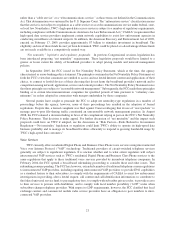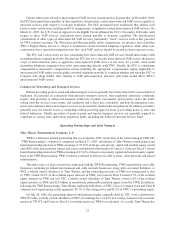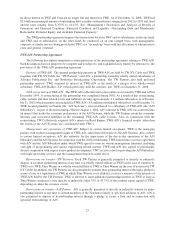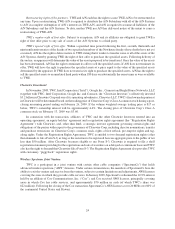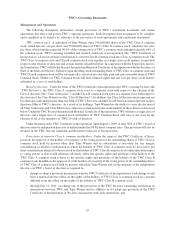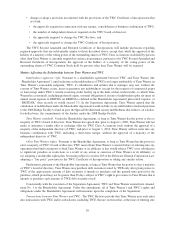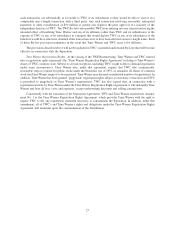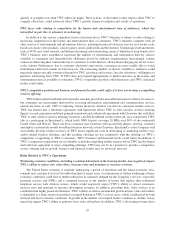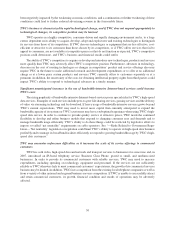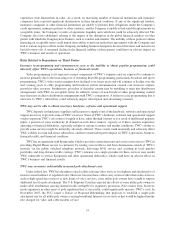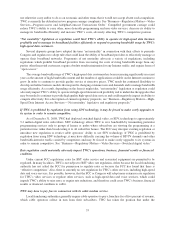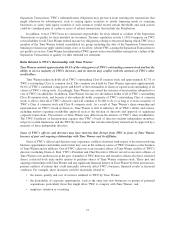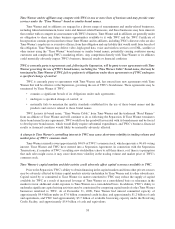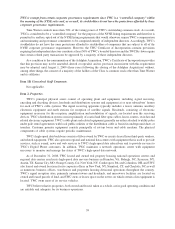Time Warner Cable 2008 Annual Report Download - page 39
Download and view the complete annual report
Please find page 39 of the 2008 Time Warner Cable annual report below. You can navigate through the pages in the report by either clicking on the pages listed below, or by using the keyword search tool below to find specific information within the annual report.quickly or at higher costs than TWC otherwise might. These actions, or the failure to take steps to allow TWC to
compete effectively, could adversely affect TWC’s growth, financial condition and results of operations.
TWC faces risks relating to competition for the leisure and entertainment time of audiences, which has
intensified in part due to advances in technology.
In addition to the various competitive factors discussed above, TWC’s business is subject to risks relating to
increasing competition for the leisure and entertainment time of consumers. TWC’s business competes with all
other sources of entertainment and information delivery, including broadcast television, movies, live events, radio
broadcasts, home video products, console games, sports, print media and the Internet. Technological advancements,
such as VOD, new video formats, and Internet streaming and downloading, many of which have been beneficial to
TWC’s business, have nonetheless increased the number of entertainment and information delivery choices
available to consumers and intensified the challenges posed by audience fragmentation. Increasingly, content
owners are delivering their content directly to consumers over the Internet, often without charging any fee for access
to the content. Furthermore, due to consumer electronics innovations, consumers are more readily able to watch
such Internet-delivered content on television sets. The increasing number of choices available to audiences could
negatively impact not only consumer demand for TWC’s products and services, but also advertisers’ willingness to
purchase advertising from TWC. If TWC does not respond appropriately to further increases in the leisure and
entertainment choices available to consumers, TWC’s competitive position could deteriorate, and TWC’s financial
results could suffer.
TWC’s competitive position and business and financial results could suffer if it does not develop a compelling
wireless offering.
TWC believes that broadband cable networks currently provide the most efficient means to deliver its services,
but consumers are increasingly interested in accessing information, entertainment and communication services
outside the home as well. TWC is exploring various means by which it can offer its customers mobile services.
TWC has entered into a wholesale agreement with Sprint that allows TWC to offer wireless services utilizing
Sprint’s second-generation and third-generation network and a wholesale agreement with Clearwire that will allow
TWC to offer wireless services utilizing Clearwire’s mobile broadband wireless network, once constructed. TWC
also is a participant in SpectrumCo, which holds AWS licenses covering 20 MHz over 80% of the continental
United States and Hawaii. There can be no assurance that Clearwire will successfully finance, develop, construct
and deploy a nationwide mobile broadband wireless network or that Clearwire, SpectrumCo or the Company will
successfully develop wireless services. If TWC incurs significant costs in developing or marketing mobile voice
and/or related wireless offerings, and the resulting offerings are not competitive with the offerings of TWC’s
competitors or appealing to TWC’s customers, TWC’s business and financial results could suffer. In addition, if
TWC’s competitors expand their service bundles to include compelling mobile features before TWC has developed
and rolled out equivalent or more compelling offerings, TWC may not be in a position to provide a competitive
service offering and its growth, business and financial results may be adversely affected.
Risks Related to TWC’s Operations
Weakening economic conditions, including a continued downturn in the housing market, may negatively impact
TWC’s ability to attract new subscribers, increase rates and maintain or increase revenues.
The United States economy is currently undergoing a period of slowdown and the future economic envi-
ronment may continue to be less favorable than that of recent years. A continuation or further weakening of these
economic conditions could lead to further reductions in consumer demand for the Company’s services, especially
premium services and DVRs, and a continued increase in the number of homes that replace their traditional
telephone service with wireless service, which would negatively impact TWC’s ability to attract customers,
increase rates and maintain or increase subscription revenues. In addition, providing basic video services is an
established and highly penetrated business. TWC’s ability to achieve incremental growth in basic video subscribers
is dependent to a large extent on growth in occupied housing in TWC’s service areas, which is influenced by both
national and local economic conditions. If growth in the number of occupied homes continues to decline, it may
negatively impact TWC’s ability to gain new basic video subscribers. In addition, TWC’s advertising revenues have
29




